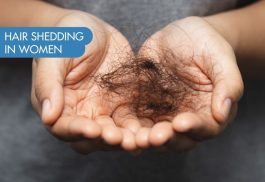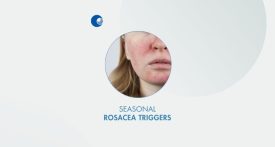In our society, hair can be a powerful form of self-expression. For many women, hair reflects personality, culture and identity. It can be styled to suit the mood of a moment – a fancy up-do for a formal event or a simple ponytail for relaxing at home.
So, when hair begins to thin or shed more than usual, women may find the change deeply personal and concerning. At Sinclair Dermatology , we understand both the emotional and physical aspects of hair loss. Our team is committed to providing clinical care that respects both your health and your experience.
What is the difference between hair shedding and hair loss?
Hair shedding refers to the natural release of hair from the scalp, typically 50-100 hairs per day . It occurs as part of the hair’s normal cycle and may increase temporarily in response to life events such as stress, illness or childbirth.
Hair loss, on the other hand, is when hair stops growing from the follicle altogether. This can result in visible thinning, a widening parting or patchy loss, depending on the cause.
Not all hair shedding is a cause for alarm. Still, it’s important to understand what’s considered normal, what may signal something more persistent, and when it’s time to seek support from a medical professional.
Common causes of hair shedding and thinning in women
Several conditions and lifestyle factors can contribute to increased hair fall or hair thinning in women. These include:
- Telogen effluvium: A common cause of temporary shedding often triggered by stress, surgery, illness, rapid weight loss, or childbirth.
- Female pattern hair loss: Also known as androgenetic alopecia, this is a genetic condition that typically causes gradual thinning, especially around the crown and part line.
- Hormonal changes : Hair thinning may occur due to changes during menopause, postpartum periods, or thyroid dysfunction.
- Nutritional deficiencies : Low levels of certain vitamins or minerals can disrupt the hair growth cycle.
- Traction alopecia : Hair loss due to prolonged tension from tight hairstyles such as braids, ponytails or extensions.
- Underlying medical conditions: Conditions such as polycystic ovarian syndrome (PCOS), thyroid disease or autoimmune disorders may affect hair growth.
Identifying the type of hair loss
Understanding your type of hair loss is the first step in finding appropriate treatment. Talk to your GP and ask for a referral to a dermatologist (a doctor who specialises in treating hair, skin or nail conditions).
If you’re referred to Sinclair Dermatology, we’ll start with a conversation about your hair loss and its impact. Then we’ll assess your hair and scalp health, which may include:
- A clinical examination
- Blood tests (where appropriate)
- Scalp imaging.
The results of these investigations help us to understand the nature and likely progression of your hair loss so that we can recommend evidence-based treatments.
Treatment options available
The appropriate management for hair shedding or hair loss depends on the underlying cause, stage and severity of your condition.
Treatments may include:
- Topical therapies: Some over-the-counter products, such as non-prescription minoxidil formulations, may support hair density and regrowth. Ask your pharmacist for advice.
- Prescription medications: Your doctor may recommend certain prescription medications after your consultation.
- Lifestyle and nutritional advice: Addressing any deficiencies, reducing physical or psychological stress, and improving dietary intake can support overall scalp health.
- Hair transplantation: Some women may consider a hair transplant.
- Scalp care products: Medically formulated shampoos, conditioners and peptide-based serums may be recommended depending on scalp condition and sensitivity.
- Skilled hairdressing: The Sinclair Hair Salon supports many women experiencing hair loss, providing product advice, hair styling, colour and cutting, hair extensions, hair pieces and camouflage.
When to seek help
If you have noticed increased hair shedding, visible thinning or changes in your hair’s density or texture, we recommend seeking a medical opinion to help you access evidence-based treatments.
Disclaimer
All information is general and not intended as a substitute for professional advice.
References
- American Academy of Dermatology Association, Do you have hair loss or hair shedding? https://www.aad.org/public/diseases/hair-loss/insider/shedding# , [Accessed 16 July 2025]
- DermNet, Telogen effluvium, https://dermnetnz.org/topics/telogen-effluvium , [Accessed 16 July 2025]
- Healthdirect, Female pattern hair loss, https://www.healthdirect.gov.au/female-pattern-hair-loss , [Accessed 16 July 2025]
- Harvard Health, Vitamins, minerals and hair loss – is there a connection? https://www.health.harvard.edu/diseases-and-conditions/vitamins-minerals-and-hair-loss-is-there-a-connection , [Accessed 16 July 2025]
- Healthline, Traction alopecia, https://www.healthline.com/health/traction-alopecia , [Accessed 16 July 2025]
- Medical News Today, PCOS and hair loss, https://www.medicalnewstoday.com/articles/pcos-and-hair-loss , [Accessed 16 July 2025]
- Healthline, What’s the relationship between your thyroid and hair loss? https://www.healthline.com/health/thyroid-and-hair-loss , [Accessed 16 July 2025]
- Mayo Clinic, Can stress cause hair loss? https://www.mayoclinic.org/healthy-lifestyle/stress-management/expert-answers/stress-and-hair-loss/faq-20057820 , [Accessed 16 July 2025]
- Guo EL, Katta R. Diet and hair loss: effects of nutrient deficiency and supplement use. Dermatol Pract Concept. 2017 Jan 31;7(1):1-10. doi: 10.5826/dpc.0701a01. PMID: 28243487; PMCID: PMC5315033. https://pmc.ncbi.nlm.nih.gov/articles/PMC5315033/ , [Accessed 16 July 2025]







